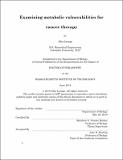Examining metabolic vulnerabilities for cancer therapy
Author(s)
Luengo, Alba
DownloadFull printable version (4.252Mb)
Other Contributors
Massachusetts Institute of Technology. Department of Biology.
Advisor
Matthew G. Vander Heiden.
Terms of use
Metadata
Show full item recordAbstract
Metabolic reprogramming is essential for cancer cells to balance energetics, maintain redox homeostasis, and synthesize biosynthetic precursors. Many chemotherapeutics that target metabolism are essential components of standard cancer treatment regimens, arguing that there is a therapeutic window to target the metabolic dependencies of cancer cells. However, the use of these drugs as cancer therapies was determined empirically, and rational approaches to directly target the metabolism of cancer cells, especially reprogrammed glucose metabolism, have proved challenging, in part because it is not well understood which metabolic processes are most important for cancer cell proliferation and survival. The goal of this dissertation is to explore metabolic pathways preferentially used by cancer cells in order to identify potential tumor dependencies that could be exploited for clinical benefit. We first determined that production of reactive byproducts is an indirect consequence of the altered glucose metabolism of cancer cells, which suggests that clinically targeting secondary effects of reprogrammed tumor metabolism could be an approach for designing novel cancer treatments. Next, we found that a molecular driver for the altered glucose metabolism of cancer cells is limited electron acceptor availability, suggesting that interventions that further restrict the oxidative capacity of tumors could also have anticancer efficacy. Finally, we interrogated the metabolic fluxes of breast cancers proliferating in different microenvironments and determined that tumors in the brain parenchyma display enhanced lipid biosynthesis, which could guide therapeutic strategies to treat cancer based on tumor site. Collectively, these studies contribute to an understanding of how the reprogrammed metabolism of cancer cells introduces targetable dependencies, with the aim of optimizing cancer therapies.
Description
Thesis: Ph. D., Massachusetts Institute of Technology, Department of Biology, 2018. This electronic version was submitted by the student author. The certified thesis is available in the Institute Archives and Special Collections. Cataloged student-submitted from PDF version of thesis. Vita. Includes bibliographical references.
Date issued
2018Department
Massachusetts Institute of Technology. Department of BiologyPublisher
Massachusetts Institute of Technology
Keywords
Biology.